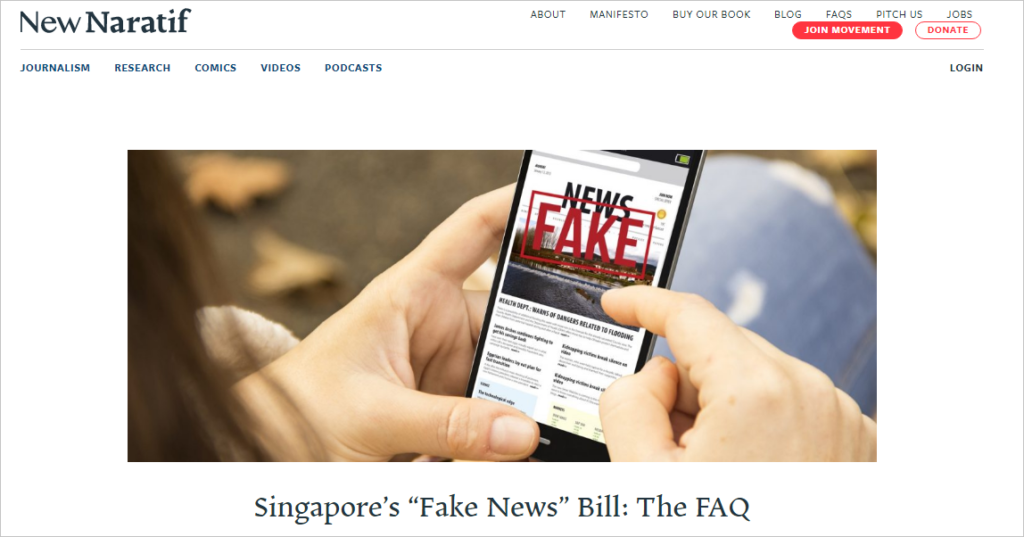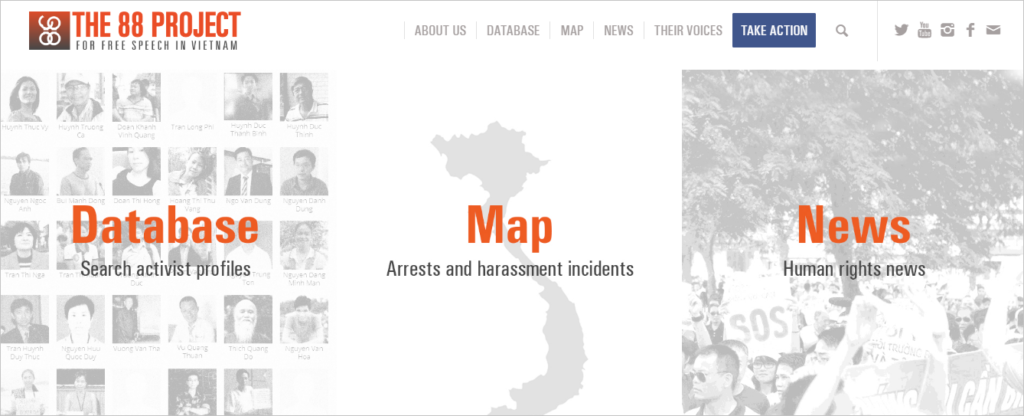Minds of the Movement
An ICNC blog on the people and power of civil resistance
by James GomezJune 13, 2019
In response to dwindling public trust in their officials and institutions, authoritarian governments in many Southeast Asian countries are exploiting “fake news” as a political tool against their critics.
Governments, for example in Singapore and the Philippines, are dismissing as fake news many critical opinions, research findings, and news content that are not in line with the government stance. This growing trend can be understood as systematic attempts to curb freedom of expression and undermine the men, women, and organizations behind these dissenting opinions.
To this end, since 2017, governments in Vietnam, Thailand, and elsewhere in the region have been introducing new legislation or revising existing laws to use against dissidents. These laws are positioned by the authorities as necessary for fostering responsible communications and to protect social harmony. However, in practice, authoritarian regimes use these vaguely worded laws to shield themselves from criticism, especially during election periods.
Attacks against Activists in the Region
This trend is widespread across the Southeast Asian region.
In Vietnam, in January 2019, authorities arrested Nguyen Van Vein using Article 109 of the 2015 Criminal Code for the attempt to “overthrow the people's administration.” Nguyen, an environmental activist, is a member of the Brotherhood of Democracy, which has been a target of government crackdown in recent years. The organization saw most of their key members sentenced to prison for human rights and pro-democracy activism. Article 117 of the 2015 Criminal Code and the 2019 Cybersecurity Law also provide a basis for authorities to press charges and punish those accused of spreading online “propaganda against the state.” Since January 2019, at least four people were either investigated or charged under Article 117 for their comments on Facebook. Facebook itself was a target when the Vietnamese government announced that month that the company had violated the country’s cybersecurity law.

New Naratif is one of the critical online news outlets feeling the pinch of closing civil society space in Southeast Asia.
In Singapore, in April 2018, editors Kirsten Han and PJ Thum of the New Naratif, a Southeast Asia focused media portal, decided to register their independent portal as a company, Observatory Southeast Asia (OSA), to gain a legal status. However, the Accounting and Corporate Regulatory Authority (ACRA) refused the application on the grounds that the proposed company’s objective was political in nature and that its funding was linked with George Soros’s Open Society Foundation. In the statement, ACRA reverted to a common refrain among authoritarian regimes: that it would not allow foreign interference in domestic governance, nor allow locals to be used by foreigners to pursue political activity in the country, even though ACRA provided no evidence of interference. ACRA’s intervention was based on Singapore’s Political Donation Act, which places strict criteria for cause-related organizations and activities (often resulting in reduced support for civil society).
In the Philippines, in March 2019, a Duterte administration official claimed that the United Nations (UN) had been “infiltrated by the Communist Party of the Philippines through Ms. Tauli-Corpuz,” referring to Victoria Tauli-Corpuz, a Filipina UN Special Rapporteur on the rights of indigenous people. The administration's disdain for the UN comes from the latter's vocal criticism of President Duterte’s highly controversial “war on drugs.”
In Laos, in September 2018, Phijika Boonkwang, president of a local football club in Vientiane who enjoys celebrity status in the country, shocked followers when she announced her resignation from the club. Previously, she had received a 90-day ban from football-related activities after she broadcasted live from her Facebook account complaining about the conditions of the road leading to the national football federation. According to the authorities, Boonkwang was harming the country’s reputation by conducting inappropriate activities on Facebook. However, many believed it was rather her previous outspoken remarks of how poorly the government had handled humanitarian assistance operations during the 2018 collapse of a hydroelectric dam, which displaced at least 6,600 people and resulted in 200 dead or missing. During the incident, Prime Minister Thongloun Sisoulith warned people of fake news coming from unofficial, foreign news outlets.
Impact of Government Disinformation Attacks on Activists
Attacks on critics in the region have given rise to a climate of fear. In the short term, many choose to exercise self-censorship and break off activism for a time, waiting for the storm to pass.
For example, after the military staged a coup in 2014, prominent Thai academics and activists Somsak Jeamteerasakul and Pavin Chachavalpongpun fled the country. Their advocacy for the abolishment of lèse majesté law—which criminalizes any criticism, insult, or threat against the king and other royalty—had put them in peril at a time when the political atmosphere in the country was extremely strained. Many other Thais in the same situation are self-exiled in other countries where they study, take up jobs, or continue their activism as members of the diaspora.
Similarly, during the run-up to the 2018 elections in Cambodia, Prime Minister Hun Sen used legal means to close down independent media houses and election monitoring NGOs, and dissolved the Cambodia National Rescue Party (CNRP), claiming that it was conspiring with the United States to overthrow the government. CNRP leader Kem Sokha was also arrested in a midnight raid. As a result, many Cambodian NGO workers and CNRP members fled to neighboring Thailand.
Other activists go underground and operate anonymously in their countries. In Vietnam, a number of Facebook pages such as the Vietnamese, Defend the Defenders, and the 88 project pick up stories about human rights abuses, corruption, and government inefficiency that are not covered by the mainstream media. However, most of this content is pushed out without revealing the contributor’s identity or, if revealed, they are based overseas.

The 88 Project is an online outlet that "shares stories of and advocates for Vietnamese activists who are persecuted because of their peaceful dissent."
What Can Activists Do to Fight Government Disinformation?
In the short term, the supposed fake news attacks by authoritarian governments have forced civil society actors and activists in Southeast Asia to adopt coping mechanisms for survival. However, in the mid to long term, more durable and strategic responses against these attacks are needed to legitimize and provide security to the work of activists in the region.
For this to happen, activists in Southeast Asia may consider placing an exceptionally strong focus on raising awareness among international journalists and other external actors about authoritarian government disinformation and repression. Often, the administration of the laws mentioned above does not have independent oversight and thus provides impunity to governments and their appointees.
One tool that can help activists raise awareness in a smart way is the Spectrum of Allies, designed to identify specific segments, groups, and individuals in a society who hold negative or positive opinions about a movement or cause. This exercise equips activists with valuable information for planning strategic outreach and messaging to neutralize certain opponents on the one hand, and find new allies on the other.
Strategically, civil society actors could adapt the activist’s guide to fighting foreign disinformation warfare to their domestic needs and disseminate it widely among their constituents. One of the guide’s strategic stipulations is to “articulate how your activism and causes relate to nurturing and defending the truth.”
In the meantime, the continued use of fake news attacks on activists undermines the already low level of political trust in these authoritarian regimes—and history has often dealt a losing hand to such regimes.

James Gomez
Dr. James Gomez is Chair, Board of Directors of the Asia Centre, a not-for-profit social enterprise that seeks to create human rights impact. A Singapore national and former politician, he is a regular news contributor and international expert.
Read More